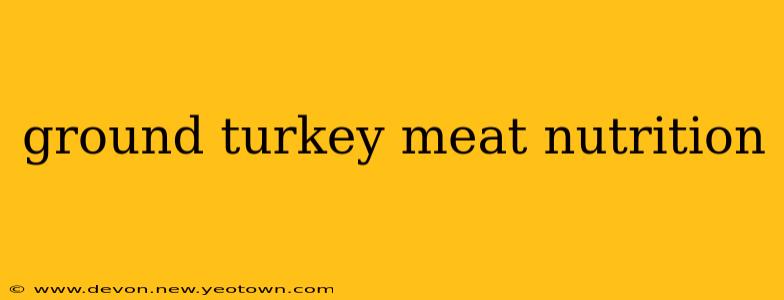Let's talk turkey – specifically, ground turkey. This versatile meat has become a staple in many kitchens, prized for its lean protein and adaptability. But beyond its culinary convenience, what's the real nutritional story behind ground turkey? Let's delve into the juicy details.
One of the first things that springs to mind when we consider ground turkey nutrition is its protein content. It's a powerhouse! A typical serving packs a significant punch of protein, essential for building and repairing tissues, boosting metabolism, and keeping you feeling full and satisfied. This makes it a fantastic choice for athletes, those aiming for weight management, and anyone seeking a healthy protein source.
But the protein isn't the only star of the show. Ground turkey also offers a decent amount of essential vitamins and minerals. We're talking niacin, which supports healthy cell function; selenium, a powerful antioxidant; and iron, crucial for oxygen transport throughout the body. The exact amounts vary depending on the type of ground turkey (more on that later!), but the overall nutrient profile is undeniably impressive.
How Does Ground Turkey Compare to Ground Beef?
This is a question that pops up frequently. The simple answer is: ground turkey is generally leaner than ground beef. This means it contains less total fat and fewer saturated fats, which are linked to heart disease. However, the fat content in ground turkey can vary significantly based on the grind – more on that in the next section. So, while generally healthier, it's not a blanket "always better" scenario. Both offer valuable nutrients; the best choice depends on individual dietary needs and preferences.
What are the Different Types of Ground Turkey?
This leads us to a crucial point: not all ground turkey is created equal! You'll often find different options at the grocery store:
- 93% Lean/7% Fat: This is a popular choice, offering a good balance between lean protein and flavor. The higher lean percentage means lower fat content.
- 96% Lean/4% Fat: This is the leanest option commonly available, ideal for those strictly controlling their fat intake. It might be slightly drier, but it's perfect for recipes where you add moisture through other ingredients like vegetables or sauces.
- 80% Lean/20% Fat: This option has a higher fat content, resulting in a richer flavor and juicier texture. It's great for dishes where moisture and flavor are prioritized.
Understanding these variations is key to making informed choices that align with your dietary goals.
Is Ground Turkey Healthy for Weight Loss?
Yes, ground turkey can be a valuable asset in a weight-loss plan. Its high protein content keeps you feeling full and satisfied, curbing cravings and preventing overeating. The leaner options, like 93% or 96% lean, are particularly beneficial for managing calorie intake. However, remember that portion control and overall diet are still critical for effective weight loss. Don't overcook it with high-fat additions!
What are the Benefits of Eating Ground Turkey?
Beyond weight management, the benefits are numerous:
- High in Protein: Essential for muscle building and repair.
- Good Source of Iron: Crucial for oxygen transport.
- Rich in B Vitamins: Important for energy production and various metabolic processes.
- Versatile: Adaptable to numerous recipes, from tacos to meatballs.
- Leaner than Ground Beef: Generally lower in fat and saturated fat.
Are there any downsides to eating ground turkey?
While generally healthy, there are a few considerations:
- Potential for Higher Sodium: Check the nutrition label, as some ground turkey products can be high in sodium.
- Allergic Reactions: Though rare, some individuals may have an allergic reaction to turkey.
- Bacterial Contamination: As with any raw meat, proper handling and cooking are essential to prevent foodborne illnesses.
In conclusion, ground turkey offers a fantastic nutritional profile, making it a versatile and healthy addition to a balanced diet. By understanding the different types available and choosing wisely based on your needs, you can enjoy all the benefits this lean protein powerhouse has to offer. Remember to always practice safe food handling to ensure a delicious and healthy meal.

